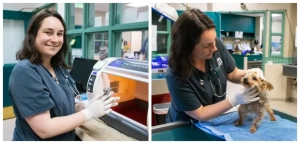Veterinarians at Pasadena Humane give care to cats, dogs and sometimes an iguana

The Intensive Care Unit is where Dr. Sarfaty starts the morning when working in shelter medicine. First up is a review of the sickest patients in the ICU. On any given day, that might include a cat having trouble urinating, a dog hit by a car or a kitten vomiting and dehydrated from a virus.
Dr. Sarfaty, one of five veterinarians at Pasadena Humane, will examine all the patients, review their records, and communicate the plan for next steps with the health team. If she suspects or knows that any of the animals have an infectious illness, the team takes special care to ensure they don’t spread diseases to other animals in the shelter.
Isolation and quarantine became buzz words for all of us during the pandemic, but they are a routine part of managing the health of an entire population of animals living together in a shelter.
After morning rounds are completed, the shelter medicine team triages the needs of the rest of the animals. “No two days have the same cases,” explains Dr. Sarfaty, but in shelter medicine, “the need for triage is always the same.”
More animals may come into the shelter throughout the day needing immediate care. Between these priority cases, the team provides care for shelter pets with important but less urgent needs, as well as sick or injured wildlife.
While Dr. Sarfaty does her morning rounds in shelter medicine, another team of veterinarians prepares for a day in surgery. Most of their day will include spay/neuters for shelter pets, owned pets and community cats. The doctors may also perform wound repairs, amputations, eye removals, and emergency surgeries for the shelter animals.
The veterinarians must be knowledgeable in caring for all types of pets, not just cats and dogs.
Dr. Sarfaty recalls a time when a “surprise iguana” arrived at the shelter as a protective custody case. The iguana required an entire room as his enclosure. Plus, the room needed to be kept at a minimum of 80 degrees and humid at all times! The team quickly converted one of our communal cat rooms into a temporary iguana habitat, and turned off the A/C. Luckily, the iguana went back to his owner the next day.
The most important part of her job, according to Dr. Sarfaty, is alleviating suffering. Nothing is better than when she is able to heal suffering animals and their true personalities emerge. But, sadly, sometimes the only way to alleviate suffering for a small number of animals in our care is through humane euthanasia. And that is the hardest part of Dr. Sarfaty’s job.
Working as a shelter veterinarian is a unique and challenging specialization within the field of veterinary medicine, and we are fortunate to have professionals who dedicate themselves to our mission of compassion and care.
The job is not without its unique rewards. The most heartwarming moments for Dr. Sarfaty are when stray animals are reunited with their families and the pets’ faces light up when they see their special people again. Adoptions into new homes are also a cause for celebration.
Next week we’ll leave the shelter and head out to the field with another member of the Pasadena Humane team, Animal Control Officer Greg Murphy. I hope you’ll come along for the ride as we “hit the road.”
Dia DuVernet is president and CEO of Pasadena Humane.
This blog post originally appeared as a column in the Pasadena Star-News on March 24, 2023.


